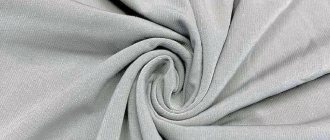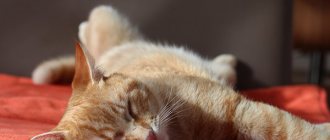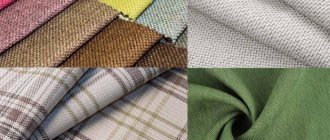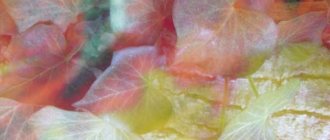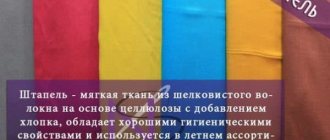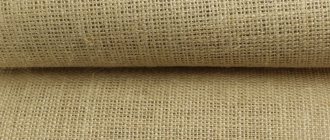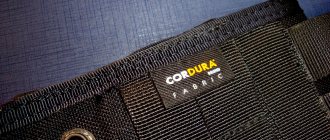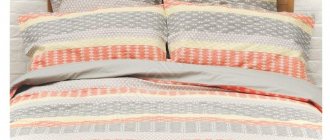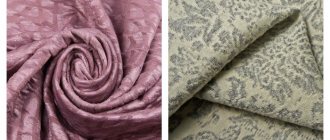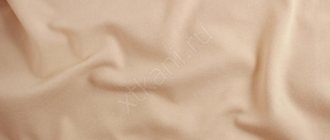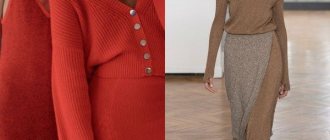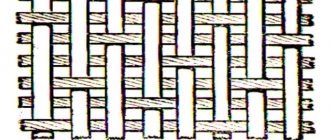- What to look for when choosing sofa fabric
- Popular furniture fabrics Velor
- Scotchgard
- Jacquard
- Gozhka
- Chenille
- Flock
- Microfiber
- Artificial leather, leatherette, eco leather
- Genuine Leather
- Velveteen
- Arpatek and faux suede
- Tapestry
- Velvet
The modern range of upholstery fabrics for furniture is striking in its abundance - there are dozens of different types, made in different colors and textures, all with their own characteristics. In no case should you be guided only by the color or price of the fabric per meter. More important are parameters such as composition and production method.
Criteria for quality upholstery
To choose high-quality fabric for a sofa, you need to consider the following factors:
| Criterion | Best performance |
| Wear resistance | From 30000-40000 rpm |
| Density | From 350-450 g/cm² |
| Pilling (rolling on a 5-point scale) | 4-5 points |
| Material tensile strength | Up to 45-50% |
| Seam tensile strength | No more than 3-4 |
| Color fastness to friction on a 5-point scale | 4-5 points |
| Fire resistance (5 classes) | 1-2 grade |
In addition to these criteria, the composition of the material is important. Sofa upholstery fabric can include only natural or synthetic components, or a combination of both. With a mixed composition, the percentage of each type of fiber is important.
Important! The environmental safety of textiles is confirmed by the European Oeko Tex Standard certificate. It is issued for a year and is renewed only upon successful completion of re-testing.
Breathability is also important. It is affected by the density, thickness of the fabric, and weaving of the threads. If the upholstery does not allow air to pass through, it will escape through the seams, which can cause them to rupture. There are other consequences - unpleasant odor, fungus, mold.
Proper care
To prolong the life of upholstery fabric, you should adhere to proper care in accordance with the requirements:
- The higher quality the fabric, the more delicate it is to care for.
- For materials that require dry cleaning using organic solvents or mechanical friction, wet cleaning should not be used, otherwise it will damage the fabric.
- Contamination should be removed as quickly as possible.
- There is no need to apply excessive force and rub the fabric so as not to disturb the structure of the material, stretch the threads or get bald spots in the pile upholstery.
- It is recommended to wash removable furniture covers without mixing them with other textiles, following the care instructions.
- It is not advisable to mix cleaning products intended for different types of fabrics.
- You need to wash stains with a sponge or brush with a product applied to it.
- If the contamination is severe and cannot be cleaned at home, you can use the services of professional dry cleaning.
It becomes clear that choosing upholstery fabric is an important and responsible matter. Velor is pleasant to the touch, and tapestry is aristocratic, flock is modern, and matting is practical, each canvas is attractive in its own way. Having understood the features and properties of materials, you can create your own unique and inimitable style in interior design.
Categories of fabrics for upholstery of sofas
In terms of density and strength, sofa upholstery falls into one of the following categories:
- 0 (cotton, scotchgard) - the most budget option, usually natural fibers, strength and service life are low;
- 1 (corduroy, flock with a fabric base) – strength and durability are slightly higher;
- 2 – higher strength, ease of maintenance, average price;
- 3 (tapestry, chenille) – complex texture, more varied design, requires special care;
- 4 (chenille, suede) – high density, tensile strength, price and quality are optimally combined;
- 5 – high density, wear resistance, natural base, varied designs, but requires constant care, high price;
- 6 (artificial leather, arpatek) – properties are similar to the previous category;
- 7 – low-density genuine leather in the budget segment;
- 8 – expensive genuine leather, good elasticity, high quality.
The category and other information about the upholstery or finished sofa is contained in the product passport.
Names and properties of materials
Sofa upholstery can be textile or non-woven. Before choosing, you should study the characteristics of each type.
Leather
This material attracts with its prestigious appearance, durability, and strength. The leather is easy to clean, it does not collect dust and hair, and is moisture resistant.
Among the disadvantages are the price, limited color range, and the risk of scratching or burning the surface. Sofas with such upholstery are slippery, so they are not suitable as a sleeping place. The material can be unpleasant to the touch - it is cold and sticks to bare skin.
Leatherette
This option is a good replacement for genuine leather. Its artificial counterpart is quite durable, not afraid of dirt and moisture, and is cheaper. Leatherette practically does not absorb odors and is easy to clean. It does not cool, unlike natural material, but also sticks to the skin.
Faux upholstery will crack over time. It is poorly affected by high temperatures and direct sunlight. Another disadvantage is the limited color range.
One of the options for artificial upholstery is eco-leather. It is a polyurethane with a porous structure and a dense cotton base. This material is wear-resistant and breathable. With an external resemblance to genuine leather, the price is several times cheaper.
Faux suede
This woven material is also called furniture suede. It is microfiber. It has low pile and a lot of micropores in its structure. Externally, artificial suede is almost no different from natural one, attracting with its pleasant velvety surface. This material is durable, abrasion-resistant, and affordable. An important plus is the large selection of colors.
Author:
Anastasia Kukushkina
I hope you enjoy the article I have prepared for you! If you find errors in it, write to me about it! I will answer any questions you have, ask them!
